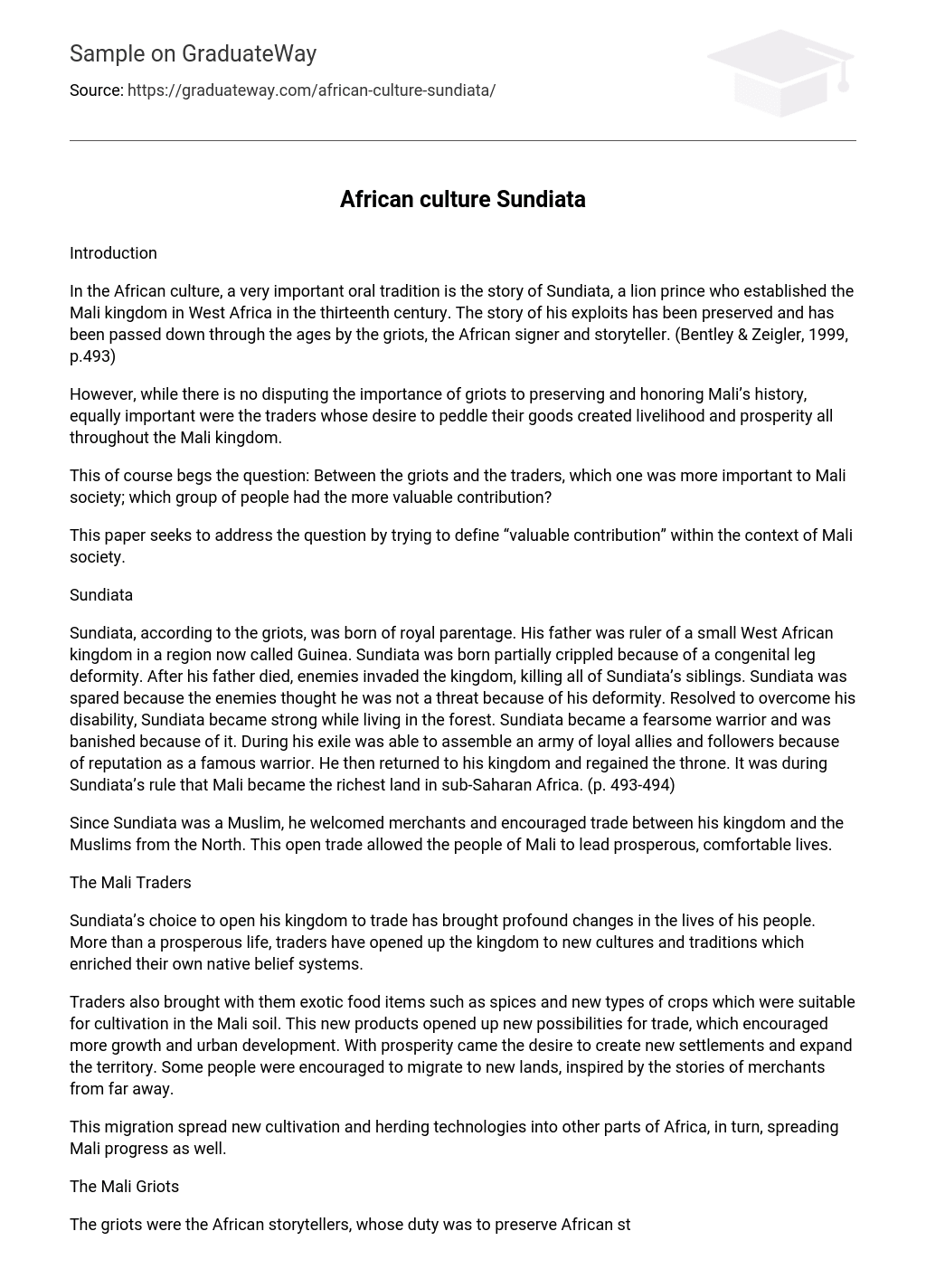Introduction
In the African culture, a very important oral tradition is the story of Sundiata, a lion prince who established the Mali kingdom in West Africa in the thirteenth century. The story of his exploits has been preserved and has been passed down through the ages by the griots, the African signer and storyteller. (Bentley & Zeigler, 1999, p.493)
However, while there is no disputing the importance of griots to preserving and honoring Mali’s history, equally important were the traders whose desire to peddle their goods created livelihood and prosperity all throughout the Mali kingdom.
This of course begs the question: Between the griots and the traders, which one was more important to Mali society; which group of people had the more valuable contribution?
This paper seeks to address the question by trying to define “valuable contribution” within the context of Mali society.
Sundiata
Sundiata, according to the griots, was born of royal parentage. His father was ruler of a small West African kingdom in a region now called Guinea. Sundiata was born partially crippled because of a congenital leg deformity. After his father died, enemies invaded the kingdom, killing all of Sundiata’s siblings. Sundiata was spared because the enemies thought he was not a threat because of his deformity. Resolved to overcome his disability, Sundiata became strong while living in the forest. Sundiata became a fearsome warrior and was banished because of it. During his exile was able to assemble an army of loyal allies and followers because of reputation as a famous warrior. He then returned to his kingdom and regained the throne. It was during Sundiata’s rule that Mali became the richest land in sub-Saharan Africa. (p. 493-494)
Since Sundiata was a Muslim, he welcomed merchants and encouraged trade between his kingdom and the Muslims from the North. This open trade allowed the people of Mali to lead prosperous, comfortable lives.
The Mali Traders
Sundiata’s choice to open his kingdom to trade has brought profound changes in the lives of his people. More than a prosperous life, traders have opened up the kingdom to new cultures and traditions which enriched their own native belief systems.
Traders also brought with them exotic food items such as spices and new types of crops which were suitable for cultivation in the Mali soil. This new products opened up new possibilities for trade, which encouraged more growth and urban development. With prosperity came the desire to create new settlements and expand the territory. Some people were encouraged to migrate to new lands, inspired by the stories of merchants from far away.
This migration spread new cultivation and herding technologies into other parts of Africa, in turn, spreading Mali progress as well.
The Mali Griots
The griots were the African storytellers, whose duty was to preserve African stories and traditions by passing the knowledge orally, from one generation to the next. The griots allowed younger generations of Africans to remember the past, and by doing so, are then tasked to uphold the abiding traditions that have withstood the test of time.
The griots are repositories of the past, by whose oral storytelling preserves history for us to remember and learn from.
Between Griots and Traders
While trade is always important to any civilization, I believe that it is dependent on the leaders who make it possible and on the workers who make quality products that are worthy of trade. Traders travel to foreign lands in the hopes of adventure and a better life. While the effects of trading are undoubtedly far-reaching, the positive effects were not a deliberate choice; it was a wonderful product of man’s need to survive and desire to make a better life. Traders were driven by vested interests, and while their contributions to Mali society cannot be denied, the value of their contribution is diluted by the fact that trade would have taken place anyway, wherever in the world we may be.
So for me, the griots were more important to Mali society. While the Mali people themselves may not think so, I believe that the contributions of the griots are more valuable in their noble purpose of guarding Mali history. It is also by the efforts of the griots that foreign merchants, hearing stories of the griots became interested in Mali and go there to trade. To prove my point, here is an excerpt from Sundiata, “The griots, fine talkers that they were, used to boast of Niani and Mali saying: If you want salt go to Niani… If you want gold, go to Niani… If you want to see a great king, go to Niani, for it is there that the son of Sogolon lives, the man with two names.” And with the griots spreading that around, who wouldn’t want to go to Mali and trade there?
Conclusion
As it is with any group of people, it is by Mali’s collective past that she defines the identity and culture of her people. We remember our history because our lives have been built upon the lives who came before us. As such, it is incumbent upon us to look back at the past with gratitude in the hopes that we will have the same courage to leave a lasting legacy for those who will come after us. And this is ultimately what the griots have done for Mali society, spread the word around of the great kingdom that was Mali.





